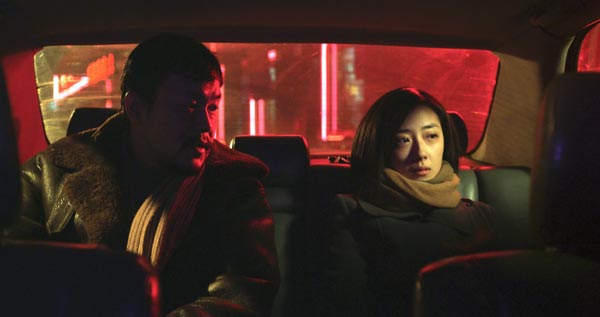 |
|
Liao Fan and Gwei Lun-mei are the lead actor and actress in the film. Provided to China Daily
|
Contrast of light and shadows
Diao Yinan, writer-director for Black Coal, Thin Ice, has a fascination with film noir, that special genre of crime thrillers popular in 1940-50s Hollywood. He made a meticulous study of classics like The Third Man and even recreated a scene on top of a Ferris wheel, albeit in a completely different dramatic situation. That kind of homage was sure to bring a smile to jury members who grew up on such cultural exposure.
Film noir, in general, is for the sophisticated in taste. It has since become a source of inspiration for younger generations of filmmakers. Diao did not imitate the style, though. He came up with his own version. While traditional noir uses black-and-white images and often sets the story in cities like Los Angeles, Diao uses the wintry landscape of suburban China as a sort of nondescript locale, creating moods that are distinctly Chinese and turning the ordinary into the slightly surreal. Streets with remnants of ice and snow, under dimly lit lamps, are totally devoid of dramatic tension in real life, yet exude an eeriness commensurate with the gruesome murders and the secrets behind each character. The sporadic and garish sources of light, such as neon on top of a building or arrays of bulks blinking in an amusement park, tend to contrast and accentuate the darkness in a way rarely seen in noir classics.
The story of Black Coal, Thin Ice takes place in contemporary China, but it is not social realism in the conventional sense. It does not tackle the wealth gap or any of the social ills of the era. The plot revolves around a trio of characters, each with a shady past. Zhang Zili is a policeman with a broken marriage and an equally derailed career. His pursuit of those behind the murders is personal and relentless, to the point that it may mirror the mentality of the criminal.
Liao Fan, who won the Silver Bear for best actor in Berlin, is nothing like Humphrey Bogart, the typical hard-boiled detective. He has an edginess all his own. In many of his roles, he displays an ability to cross over to the gray area of his characters' moral boundary and psychological health. It is a fascinating area for an actor and a small breakthrough in Chinese cinema with its rigid codes for certain types of roles.
Gwei Lun-mei also has a meaty role. It is not a femme fatale, but a woman of mystery nonetheless. The Taiwan actress plays a woman of few words, thus circumventing the pitfall of the telltale accent. As more of her secret is revealed, the role takes on more substance and Gwei embodies her complexity with authenticity in movements and postures. Wang Xuebing, an erstwhile heartthrob, plays a supporting role crucial to the plot. While he cannot hold a candle to Orson Welles in The Third Man, he conveys a lot of background information not as much by acting as by his enfant terrible disposition.
Related:
Chinese directors master Nordic noir, shoot-'em-up Western
Strong Chinese turnout in this year's Berlin Film Festival




